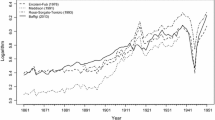Summary
Business cycles are considered to be milder in Austria than in other countries. This article tries to test if this view is correct. If it is correct it will investigate what are the factors dampening the amplitude of Austrian business cycles.
It comes out in fact, that the fluctuations of global demand are considerably weaker in Austria than in almost all other industrialized countries. The amplitude of fluctuations of employment and prices is weaker as well but not that much so. Little evidence is found that Austria's better cyclical performance is due to superior discretionary policies. Rather the attempts to stabilize income and expectations in the long run may have contributed. Especially wages and disposable income stabilized private consumption, the evidence for a reduction of the amplitude of investment fluctuations via stabilizing entrepreneurs' expectations is much weaker. Strong evidence could be found that the fluctuations of the several components of demand compensate each other to a larger extent in Austria than elsewhere. The causes of the larger offset are not clear yet.
An interesting sideproduct of this investigation is that the amplitudes of fluctuations and their patterns differ considerably from country to country. Policy can shape these patterns even if it is long-run policy and institutions rather than discretionary acts of fiscal and monetary policy. Especially price and quantity fluctuations are not alternatives. Good policy can dampen both at the same time.
Similar content being viewed by others
Literaturhinweise
Aiginger, K., Unsicherheitstheorie und unternehmerische Produktionsentscheidung, Campus, Frankfurt-New York, 1985.
Amihud, Y., Mendelson, H., “Price Smoothing and Inventory”, Review of Economic Studies, 1983, 50(1), S. 87–98.
Coe, D. T., Holtham, G., “Output Responsiveness and Inflation. An Aggregate Study”, OECD, Economic Studies, 1983, (1), S. 93–145.
Dornbusch, R., Open Economy Macroeconomics, Basic Books, New York, 1980.
Froyen, R. T., Waud, R. N., “Further International Evidence on Output-Inflation Tradeoffs”, American Economic Review, 1980, 70(3), S. 409–421.
Gahlen, B., “Preis- und Mengenvariabilität bei Stagflation”, Beitrag der DGF-Forschungsgruppe am Institut für Volkswirtschaftslehre der Universität Augsburg, 1984, (6).
Gordon, R. J., “Output Fluctuations and Gradual Price Adjustment”, Journal of Economic Literature, 1981, 19(2), S. 493–530.
Grönberg, R., Rahmeyer, F., “Preis- und Mengenanpassungen in den Konjunkturzyklen der Bundesrepublik Deutschland, 1963–1981”, Jahrbücher für Nationalökonomie und Statistik, 1985, 200(3), S. 239–261.
Guger, A., “Der Vollbeschäftigungssaldo als Instrument zur Beurteilung der konjunkturellen Wirkung der Budgetpolitik des Bundes”, Wirtschaft und Gesellschaft, 1978, 4(4), S. 341–457.
Handler, H., “Capital Mobility Versus Sterilization Policy. A Time Series Approach for Austria”, Empirica, 1985, 12(2), S. 163–190.
Holzmann, R., Winckler, G., “Austrian Economic Policy. Some Theoretical and Critical Remarks on ‘Austro-Keynesianism’”, Empirica, 1983, 10(2), S. 183–204.
Lehner, G., “Steueraufkommen und Konjunktur”, WIFO-Monatsberichte, 1984, 57(2), S. 59–72.
Lucas, R. E., “Some International Evidence on Output-Inflation Tradeoffs”, American Economic Review, 1973, 63(3), S. 326–334.
Lucas, R. E., “Understanding Business Cycles”, in Brunner, K., Meltzer, A. H. (Hrsg.), “Stabilization of the Domestic and International Economy”, Carnegie Rochester Conference Series on Public Policy, 1977, 5 (zitiert nach dem Wiederabdruck in Lucas, R. E., Studies in Business Cycle Theory, Basil Blackwell, Oxford, 1981).
Lundberg, E., Instability and Economic Growth, Yale University Press, New Haven-London, 1968.
Moosa, S. A., “The Double Whammy of Stagflation and Uncertainty”, Kredit & Kapital, 1983, 16(3), S. 297–315.
Nemeth, N., Seidel, H., “Die Revision der Volkswirtschaftlichen Gesamtrechnung 1964 bis 1977”, WIFO-Monatsberichte, 1978, 51(11), S. 546–552.
Ramser, H. J., “Innovationen, Unsicherhelt und unvollständige Information”, in Bombach, G., Gahlen, B., Ott, A. E. (Hrsg.), Neuere Entwicklungen in der Investitionstheorie und-politik, Mohr-Siebeck, Tübingen, 1980, S. 207–254.
Schebeck, F., Tichy, G., “Die ‘Stylized Facts’ in der modernen Konjunkturdiskussion”, in Bombach, G., Gahlen, B., Ott, A. E. (Hrsg.), Perspektiven der Konjunkturforschung, Mohr-Siebeck, Tübingen, 1984 (eine ausführliche Version erschien unter demselben Titel als WIFO Working Paper, 1984, (2)).
Seidel, H., “Austro-Keynesianismus”, Wirtschaftspolitische Blätter, 1982, (2), S. 11–15.
Teidel, H., “Die Stabilisierungsfunktion der Budgetpolitik: Gestern — Heute — Morgen”, Empirica, 1985, 12(1), S. 87–107.
Taylor, J. B., “Estimation and Control of a Macroeconomic Model with Rational Expectations”, Econometrica, 1979, 47(5), S. 1267–1286.
Tichy, G., Konjunkturschwankungen. Theorie, Messung, Prognose, Springer, Berlin-Heidelberg-New York, 1976.
Tichy, G., “Austro-Keynesianismus — Gibt's den? Angewandte Psychologie als Konjunkturpolitik”, Wirtschaftspolitische Blätter, 1982, 29(3), S. 50–64.
Tichy, G., “Stategy and Implementation of Employment Policy in Austria”, Kyklos, 1984, 37(3), S. 363–386.
Tichy, G., “Die Folgen der Wechselkursveränderungen für Terms of Trade und Verteilung”, in Hesse, H., Streißler, E., Tichy, G. (Hrsg.), Außenwirtschaft bei Unsicherheit, Mohr-Siebeck, Tübingen, 1985.
Wüger, M., “Der private Konsum im Strukturwandel”, Österreichische Strukturberichterstattung, Kernbericht 1984, Band III, WIFO, Wien, 1985, S. 71–115.
Author information
Authors and Affiliations
Additional information
Der Autor dankt Univ.-Prof. Dr. Hans Seidel, Univ.-Doz. Dr. Karl Aiginger und den anonymen Gutachtern für wertvolle Anregungen und Verbesserungsvorschläge.
Rights and permissions
About this article
Cite this article
Tichy, G. Die Amplitude der österreichischen Konjunkturschwankungen im internationalen Vergleich. Empirica 13, 69–96 (1986). https://doi.org/10.1007/BF00924934
Issue Date:
DOI: https://doi.org/10.1007/BF00924934




